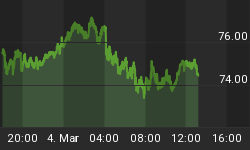If Americans feel they are being pick-pocketed by inflation, they should take a look overseas. With the United States pushing its trade deficit and dollars on the rest of the world, many world central banks thought they could grab a "free lunch" by buying US Treasuries to hold the exchange rate of their currencies down, and paying for them by printing up free local currency. This so-called free lunch has turned out to be mighty expensive.
Currently, over 3 billion people are experiencing what it feels like to be robbed by inflation. While free trade and globalization initially pushed up the standard of living in many developing countries, increases in the demand for basics like food and fuel, fueled by an over-supply of money and credit, have goosed inflation in a big way. So much so, the middle class and poor in many countries are literally being wiped out. Starving, desperate, and angry people are appearing in the headlines daily as they try to bring this dire situation to the attention of their leaders through violent demonstrations and riots. (What you don't see in the press every day, but should, is in the chart below):
Year-Over-Year Inflation | ||||
Zimbabwe | 1,000,000% | U.A.E | 12% | |
Argentina (2) | 25 to 30% | Turkey | 11% | |
Latvia | 30% | Costa Rica | 11% | |
Venezuela | 29% | South Africa | 11% | |
Vietnam | 25% | Philippines | 10% | |
Iran | 25% | Indonesia | 10% | |
Egypt | 21% | Guatemala | 10% | |
Pakistan | 18% | Saudi | 10% | |
Bolivia | 15% | China | 9% | |
Nicaragua | 14% | India | 8% | |
Russia | 14% | Chile | 8% | |
Qatar | 14% | Thailand | 8% | |
In Argentina and Vietnam, as one example, panic-stricken residents are swapping their currencies for dollars and Euros. But given the double-digit growth in M3 for the dollar and euro, these inflating currencies may prove to be a dangerous place to hide from inflation. Even for the currencies that are touted as being stable, interest rates are still below the rates of inflation wherever you look.
Unless interest rates are increased materially above the rate of inflation, prices will continue to rise. But with the high level of bad debt in the world banking system, the financial system would not survive the strain of a significant interest rate increase. For a period of time, stagflation will become a new way of life for many of us.
Clearly, if you reside in one of the countries mentioned in the chart, and want to avoid being wiped out entirely, one of the safest hedges against inflation is to buy gold and silver. Because I'm patriotic and know that preserving my capital will help America preserve its capital, I'll continue to buy them too.
(1) The statistics indicated are as recent as possible and were taken from articles appearing in The Financial Times, Economist, and other publications in the financial press.
(2) On June 9th, The Financial Times published an article that suggested official inflation statistics are not to be believed and inflation expectations show rates of 25% to 30%.















